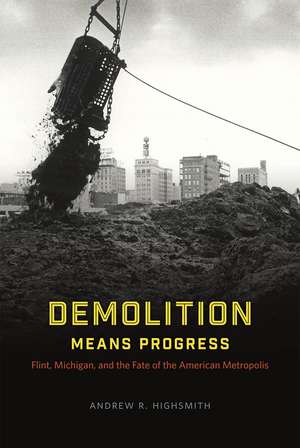Demolition Means Progress: Flint, Michigan, and the Fate of the American Metropolis: Historical Studies of Urban America
Autor Andrew R. Highsmithen Limba Engleză Paperback – 30 dec 2016
In 1997, after General Motors shuttered a massive complex of factories in the gritty industrial city of Flint, Michigan, signs were placed around the empty facility reading, “Demolition Means Progress,” suggesting that the struggling metropolis could not move forward to greatness until the old plants met the wrecking ball. Much more than a trite corporate slogan, the phrase encapsulates the operating ethos of the nation’s metropolitan leadership from at least the 1930s to the present. Throughout, the leaders of Flint and other municipalities repeatedly tried to revitalize their communities by demolishing outdated and inefficient structures and institutions and overseeing numerous urban renewal campaigns—many of which yielded only more impoverished and more divided metropolises. After decades of these efforts, the dawn of the twenty-first century found Flint one of the most racially segregated and economically polarized metropolitan areas in the nation.
In one of the most comprehensive works yet written on the history of inequality and metropolitan development in modern America, Andrew R. Highsmith uses the case of Flint to explain how the perennial quest for urban renewal—even more than white flight, corporate abandonment, and other forces—contributed to mass suburbanization, racial and economic division, deindustrialization, and political fragmentation. Challenging much of the conventional wisdom about structural inequality and the roots of the nation’s “urban crisis,” Demolition Means Progress shows in vivid detail how public policies and programs designed to revitalize the Flint area ultimately led to the hardening of social divisions.
In one of the most comprehensive works yet written on the history of inequality and metropolitan development in modern America, Andrew R. Highsmith uses the case of Flint to explain how the perennial quest for urban renewal—even more than white flight, corporate abandonment, and other forces—contributed to mass suburbanization, racial and economic division, deindustrialization, and political fragmentation. Challenging much of the conventional wisdom about structural inequality and the roots of the nation’s “urban crisis,” Demolition Means Progress shows in vivid detail how public policies and programs designed to revitalize the Flint area ultimately led to the hardening of social divisions.
Din seria Historical Studies of Urban America
-
 Preț: 224.94 lei
Preț: 224.94 lei -
 Preț: 214.33 lei
Preț: 214.33 lei -
 Preț: 153.89 lei
Preț: 153.89 lei -
 Preț: 203.46 lei
Preț: 203.46 lei -
 Preț: 132.84 lei
Preț: 132.84 lei -
 Preț: 201.36 lei
Preț: 201.36 lei -
 Preț: 196.41 lei
Preț: 196.41 lei -
 Preț: 200.74 lei
Preț: 200.74 lei -
 Preț: 178.45 lei
Preț: 178.45 lei -
 Preț: 185.70 lei
Preț: 185.70 lei -
 Preț: 215.23 lei
Preț: 215.23 lei -
 Preț: 185.94 lei
Preț: 185.94 lei -
 Preț: 205.71 lei
Preț: 205.71 lei -
 Preț: 348.08 lei
Preț: 348.08 lei -
 Preț: 283.69 lei
Preț: 283.69 lei -
 Preț: 245.49 lei
Preț: 245.49 lei -
 Preț: 264.85 lei
Preț: 264.85 lei -
 Preț: 233.25 lei
Preț: 233.25 lei -
 Preț: 218.74 lei
Preț: 218.74 lei -
 Preț: 325.05 lei
Preț: 325.05 lei -
 Preț: 249.51 lei
Preț: 249.51 lei -
 Preț: 246.09 lei
Preț: 246.09 lei -
 Preț: 277.90 lei
Preț: 277.90 lei -
 Preț: 273.67 lei
Preț: 273.67 lei -
 Preț: 290.90 lei
Preț: 290.90 lei -
 Preț: 192.30 lei
Preț: 192.30 lei -
 Preț: 261.59 lei
Preț: 261.59 lei -
 Preț: 310.30 lei
Preț: 310.30 lei -
 Preț: 227.36 lei
Preț: 227.36 lei -
 Preț: 283.30 lei
Preț: 283.30 lei -
 Preț: 260.82 lei
Preț: 260.82 lei -
 Preț: 275.92 lei
Preț: 275.92 lei -
 Preț: 241.19 lei
Preț: 241.19 lei -
 Preț: 273.80 lei
Preț: 273.80 lei -
 Preț: 271.67 lei
Preț: 271.67 lei -
 Preț: 247.40 lei
Preț: 247.40 lei -
 Preț: 351.69 lei
Preț: 351.69 lei -
 Preț: 267.82 lei
Preț: 267.82 lei -
 Preț: 287.33 lei
Preț: 287.33 lei -
 Preț: 262.41 lei
Preț: 262.41 lei -
 Preț: 232.27 lei
Preț: 232.27 lei
Preț: 246.86 lei
Nou
Puncte Express: 370
Preț estimativ în valută:
47.25€ • 51.34$ • 39.72£
47.25€ • 51.34$ • 39.72£
Carte tipărită la comandă
Livrare economică 21 aprilie-05 mai
Preluare comenzi: 021 569.72.76
Specificații
ISBN-13: 9780226419558
ISBN-10: 022641955X
Pagini: 398
Ilustrații: 35 halftones, 17 maps, 3 tables
Dimensiuni: 152 x 229 x 25 mm
Greutate: 0.53 kg
Ediția:1
Editura: University of Chicago Press
Colecția University of Chicago Press
Seria Historical Studies of Urban America
ISBN-10: 022641955X
Pagini: 398
Ilustrații: 35 halftones, 17 maps, 3 tables
Dimensiuni: 152 x 229 x 25 mm
Greutate: 0.53 kg
Ediția:1
Editura: University of Chicago Press
Colecția University of Chicago Press
Seria Historical Studies of Urban America
Notă biografică
Andrew R. Highsmith is assistant professor of history at the University of California, Irvine.
Cuprins
List of Illustrations
List of Tables
List of Abbreviations
Introduction
Part I Company Town
1 City Building and Boundary Making
2 From Community Education to Neighborhood Schools
3 Jim Crow, GM Crow
4 Suburban Renewal
5 The Metropolitan Moment
Part II Fractured Metropolis
6 “Our City Believes in Lily-White Neighborhoods”
7 Jim Crow in the Era of Civil Rights
8 Suburban Crisis
9 The Battle over School Desegregation
10 “The Fall of Flint”
Epilogue “America Is a Thousand Flints”
Acknowledgments
Abbreviations in the Notes
Notes
Index
List of Tables
List of Abbreviations
Introduction
Part I Company Town
1 City Building and Boundary Making
2 From Community Education to Neighborhood Schools
3 Jim Crow, GM Crow
4 Suburban Renewal
5 The Metropolitan Moment
Part II Fractured Metropolis
6 “Our City Believes in Lily-White Neighborhoods”
7 Jim Crow in the Era of Civil Rights
8 Suburban Crisis
9 The Battle over School Desegregation
10 “The Fall of Flint”
Epilogue “America Is a Thousand Flints”
Acknowledgments
Abbreviations in the Notes
Notes
Index
Recenzii
“Powerful. . . . Demolition Means Progress is a story of how people—in this case, the founding fathers of Flint’s white suburbs—used municipal government as a weapon, drawing borders of citizenship to exclude people of color and the poor from the region’s wealth. That’s a story that played out in metropolitan areas across America in the decades after World War II. But it was particularly devastating in Flint.”
“If you wonder why there is so much anger in the African-American communities of the US today, you should read Highsmith’s book. It is a primer on the bad things done to black people who dared to pursue the American dream. . . . Liberals will find Highsmith’s account particularly harrowing because the road to hell in Flint was often paved with good intentions. The policies of Franklin Roosevelt’s New Deal, for example, helped lay the foundation for persistent residential segregation of the city and its suburbs.”
“Demolition Means Progress excels in delineating truth from fiction by viewing Flint’s modern history in the context of local, state and national history over the past century.”
“Using the case study of Flint, Michigan, from the mid-20th century to the present, this ambitious effort to rethink US urban history is a strong work that will be of considerable value to students and scholars of US urban history, urban studies, and urban planning, as well as general readers interested in urban life in the US. . . . [He] presents a new typology of segregation as it has played out in Flint, moving beyond the concepts of de facto and de jure segregation to those of legal, administrative, and popular segregation, which he argues have greater explanatory power. Also insightful are the ongoing efforts by city residents and leaders to improve and revitalize the city in the face of the strong forces noted above, which have negatively impacted the city over the past half century. A useful epilogue brings readers up to date with relevant developments in Flint since the turn of the twenty-first century. Recommended.”
“Highsmith delivers a wide-ranging exploration of the Herculean efforts to create a prosperous, thriving metropolis—and the inequalities produced by these efforts. . . .Historians of Midwestern cities will find much of value in Demolition Means Progress.”
“Demolition Means Progress testifies to the continued vibrancy of urban history and its remapping of how we understand the twentieth-century United States. In a book bursting with ideas and fresh insights, Highsmith rethinks de jure and de facto racial segregation, creates a new vocabulary for suburban, metropolitan, and regional forms of capitalism, and brilliantly narrates the entire arc of twentieth-century American industrialization at the scale of a single city, Flint, Michigan, and its suburbs. A remarkable book.”
“In this sobering new book Highsmith tracks the fall of Flint, Michigan, once one of the nation’s greatest industrial towns, now one of its poorest cities. But this isn’t just another story of urban decay. It’s a compelling analysis of institutional injustice wrapped in the promise of revitalization, a powerful history of exclusion and destruction in the name of progress.”
“For decades in the twentieth century, Flint, Michigan, produced millions of the latest model General Motors cars, as well as made itself into a model of another kind: a metropolitan area whose relentless pursuit of a more prosperous future came at the price of growing racial segregation, economic inequality, and political fragmentation. Highsmith is a wonderful guide through the tragic interplay of deindustrialization, suburbanization, and disinvestment that unfolded in America’s industrial heartland. His is a deeply local story with enormous national significance.”
“Highsmith skillfully defines not just what was considered ‘progress’ but how its realization extended a long pattern of physical improvements at high cost to collective social welfare. Focusing especially on ways race prejudice defined life in the Vehicle City and its environs, Highsmith provides a multilayered analysis to support his contention that urban misfortunes and racial injustice have been intimately connected in the modern-era North. While the contours of Highsmith’s account of efforts to revitalize Flint are familiar in a broad sense, his examination of how racial discrimination factored into every stage of the city’s modern history is unusually detailed and convincing.”
“While individual threads of Highsmith’s interlocking narratives of suburbanization, racial segregation, and deindustrialization seem at first blush familiar to urban historians, this work is notable for its comprehensive, metropolitan approach and for adding a small-city case study to the literature on urban renewal and decline. With chronological chapters focusing on Flint’s housing and education policies, workplace discrimination, industrial decentralization, and slum clearance, Highsmith provides a fine-grained analysis of how economic and racial inequality in American cities is spatialized and planned from the federal to municipal levels.”
“In this captivating examination of corporate capitalism, urban renewal, and metropolitan fortune, Andrew R. Highsmith unpacks the mythology of the de facto versus de jure segregation binary. In its place, he proposes a tripartite framework of legal, administrative, and popular segregation that destructively shaped the twentieth-century metropolitan landscape. . . . In part by enlarging our vocabulary, he also demonstrates the relevance of a metropolitan, versus regional, lens to the discourse of deindustrialization. Highsmith’s careful parsing of the forms of segregation reveals this practice’s insidious and enduring reach.”
“Highsmith’s brilliant book is a sweeping case study that traces the policies and decisions that contributed to the rise and fall of Flint, Michigan, over the course of the twentieth century.”
“The economic crises of the ensuing decades—in their utter devastation—seem almost the end of urban history. It is one signal contribution of Demolition Means Progress, though, that we might see that history as a tortuous path of missed opportunities and bold, though often shortsighted, attempts at revitalization. It is another that the book ends with a timely reminder that Flint is not dead, as residents and civic leaders continue their quest for revitalization, even behind dauntingly fortified walls of racial segregation and inequality.”






